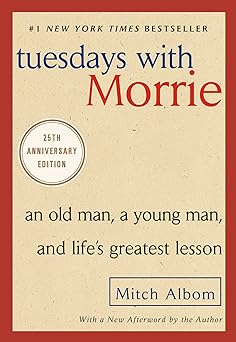More on this book
Community
Kindle Notes & Highlights
Morrie had amyotrophic lateral sclerosis (ALS), Lou Gehrig’s disease, a brutal, unforgiving illness of the neurological system.
ALS is like a lit candle: it melts your nerves and leaves your body a pile of wax.
Often, it begins with the legs and works its way up. You lose control of your thigh muscles, so that you cannot support yourself standing. You lose control of your trunk muscles, so that you cannot sit up straight. By the end, if you are still alive, you are breathing through a tube in a hole in your throat, while your soul, perfectly awake, is imprisoned inside a limp husk, perhaps able to blink, or cluck a tongue, like something from a science fiction movie, the man frozen inside his own flesh. This takes no more than five years from the day you contract the disease.
“Accept what you are able to do and what you are not able to do”; “Accept the past as past, without denying it or discarding it”; “Learn to forgive yourself and to forgive others”; “Don’t assume that it’s too late to get involved.”
“The culture we have does not make people feel good about themselves. And you have to be strong enough to say if the culture doesn’t work, don’t buy it.”
“So many people walk around with a meaningless life. They seem half-asleep, even when they’re busy doing things they think are important. This is because they’re chasing the wrong things. The way you get meaning into your life is to devote yourself to loving others, devote yourself to your community around you, and devote yourself to creating something that gives you purpose and meaning.”
“The most important thing in life is to learn how to give out love, and to let it come in.”
“Let it come in. We think we don’t deserve love, we think if we let it in we’ll become too soft. But a wise man named Levine said it right. He said, ‘Love is the only rational act.’ ”
How useful it would be to put a daily limit on self-pity. Just a few tearful minutes, then on with the day. And if Morrie could do it, with such a horrible disease…
Sometimes you cannot believe what you see, you have to believe what you feel. And if you are ever going to have other people trust you, you must feel that you can trust them, too—even when you’re in the dark. Even when you’re falling.”
“A teacher affects eternity; he can never tell where his influence stops.” —HENRY ADAMS
“Do what the Buddhists do. Every day, have a little bird on your shoulder that asks, ‘Is today the day? Am I ready? Am I doing all I need to do? Am I being the person I want to be?’ ”
“The truth is, Mitch,” he said, “once you learn how to die, you learn how to live.”
“All this emphasis on youth—I don’t buy it,” he said. “Listen, I know what a misery being young can be, so don’t tell me it’s so great. All these kids who came to me with their struggles, their strife, their feelings of inadequacy, their sense that life was miserable, so bad they wanted to kill themselves…
“And, in addition to all the miseries, the young are not wise. They have very little understanding about life. Who wants to live every day when you don’t know what’s going on? When people are manipulating you, telling you to buy this perfume and you’ll be beautiful, or this pair of jeans and you’ll be sexy—and you believe them! It’s such nonsense.”
Aging is not just decay, you know. It’s growth.
“How can I be envious of where you are—when I’ve been there myself?”
Devote yourself to loving others, devote yourself to your community around you, and devote yourself to creating something that gives you purpose and meaning.
“Mitch, if you’re trying to show off for people at the top, forget it. They will look down at you anyhow. And if you’re trying to show off for people at the bottom, forget it. They will only envy you. Status will get you nowhere. Only an open heart will allow you to float equally between everyone.”
“Each night, when I go to sleep, I die. And the next morning, when I wake up, I am reborn.” —MAHATMA GANDHI
“Death ends a life, not a relationship.”
The last class of my old professor’s life took place once a week, in his home, by a window in his study where he could watch a small hibiscus plant shed its pink flowers. The class met on Tuesdays. No books were required. The subject was the meaning of life. It was taught from experience. The teaching goes on.


